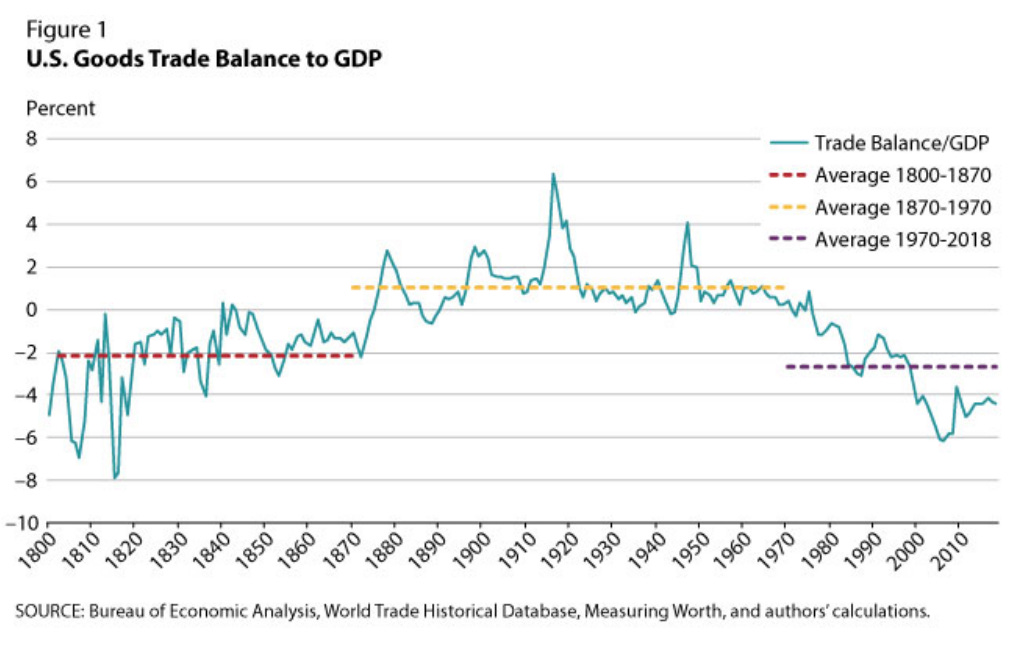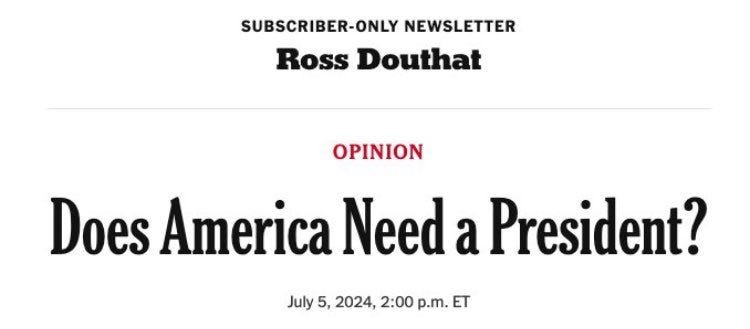Global Order: From Maypole to Potato Patch
As the US unipolar order totters like a maypole without a foundation, how much longer can its elderly elite cling to power as a multinodal potato patch global order creeps in from all directions?

The unravelling of the sutures holding the US unipolar global order together is echoed by the cognitive decline and descent into dementia of its frail octogenarian leader. Just as critical synaptic junctions fail one after another in a fading human brain, vital nodes of world power are escaping the control of the single vertical pole of US hegemony. Once freed, these liberated nodes connect, reconnect, and interweave into a robust and complex horizontal system of renewed global order.
The US unipolar disposition resembles that of a maypole, where the single dominant, fully matured American nation acts as the central pole of reference for all the "juvenile" nations to dance around; held by ideological binds that resist any centrifugal force pulling them away from the US orbit. While some nations, particularly those considered part of the West, may dance closer to the US, the system is fundamentally based on a qualitative difference: the US serves as the central standard against which all satellites are measured. American norms and interests form the core of the US polar system while those of orbiters are subordinate.
This system was triumphantly proclaimed in American political scientist Francis Fukuyama’s 1992 book, “The End of History and the Last Man.” For Fukuyama, the word “end” signifies both a goal and a termination. Distorting ideas that first appeared in the works of Prussian philosophers G.W.F. Hegel and Karl Marx, Fukuyama describes history as an evolutionary process that culminates and exhausts itself in a final plateau of progress. In this case, a global utopia of liberal democracy.
Exactly why historical evolution would ever terminate is not explained. The process of social selection can only end when environmental factors, which include technological development, are frozen into constants. This condition of an eternal historical status quo will only occur after the death of all mankind on earth.
The proclamation of an eternal American global order hastened its inevitable destruction. As the tectonic plates of US power shifted, they accumulated pressure along a fault line near Russia. The US pattern of Balkanizing clumps of resistance found its prototype in the shattering of Yugoslavia. The weak and disoriented nations that emerged had little choice but to grab a ribbon and stumble around the US maypole.
At the turn of the millennium, when America’s unipolar moments hit its second decade, many economically advanced nations remained ambivalent towards US hyperpower. Reticence turned to open hostility as George W. Bush declared a rouge roundup of the feral cattle comprising his Axis of Evil. His attempts to violently lasso Iraq onto the US maypole repelled the denizens of Old Europe.
The repulsion felt during the Bush era transformed into a magnetic pull under Obama, as Europe helplessly fell sway to America’s geopolitical good cop-bad cop ploy. Any thoughts of creating an independent pole of power to counter US hegemony melted away under the charm of Obama's symbolic redemption of Europe's troubled racial past. Europe eagerly joined the US in opening their gates to racial diversity and in trying to lasso Syria and Libya onto the US maypole.
During the US campaign to pull Middle Eastern renegades into its orbit, Russia and China watched with concern. Remembering the grandeur of the Cold War's bipolar world, Russia harboured ambitions of its own set of satellites. Gas should flow through pipelines to Europe, and the former republics of the Soviet Union should surely revolve around the gravity of Mother Russia. Little did Russia and China know that the world order they would create would have more in common with Cold War non-aligned group of nations, which eschewed all poles.
The US and NATO thought no, securing the Baltic states and in 2008 explicitly laying claim to Ukraine and Georgia. By 2014, when it became clear that Ukraine was on the verge of rejecting the West to become a satellite of Russia, the US took action and launched a bloody coup d'état in Kiev's main square under the banner of, “Fuck the EU.”
In response the American encroachment in Ukraine, the Russians intervened and saved Syria from getting corralled into the vast American herd of vassals. Russia also provided succour to the then feral Iran, locked out by sanctions from the flowing wealth of global interchange.
Meanwhile, the US economy successfully offshored its remaining manufacturing base to China. Relieved of the burden of production, it turned towards the more magical world of financialization. Conspicuous consumption was liberated from the pain of production through a form of dollar communism. A world famished for dollars eagerly exchanged the tangible fruits of their labor for bushels of green paper. Possessing the printing press for the world’s reserve currency allowed Americans to buy the world’s commodities at bargain prices. It also allowed sustained government spending far above levels of taxation.
To paraphrase historian Will Durant, "a world-order is born stoic and dies epicurean." Its first generations impassively endure hardship and pain to mould powerful institutions out of chaos and anarchy. But once the construction is complete, future generations rest on these laurels, embracing luxury and comfort. The no-nonsense cultural frugality of the past gives way to the sumptuous excesses of the present.

But the hedonism unleashed by dollar communism spread unevenly. For large segments of America, epicurean pleasure remained a distant vision, mediated only through rectangular screens. Industrial outcasts faced a life of toil and despair. For too many, a cocktail of narcotics and alcohol blurred the harsh realities of homelessness, underemployment, and alienation. They were the exurban reserve army of misery, the canvas upon which urban epicureans painted their ethereal lives of bright colors and intense pleasure. The cynical pessimism of this outcast group could find redemption only through a messianic saviour.
Trump was no throwback to the frugal days of the Greatest Generation. Hyper sumptuous, he may be an apex-epicurean, say the deplorables, but he is our epicurean. Surrounding himself in golden gaudiness fit for a Persian emperor, it somehow seems fitting that the death of America should be overseen by a real estate salesman.
With Trump's rise to power, Europe found itself in a predicament. Under Obama's charm, Europe tightly bound itself to the rainbow ribbons of the enlightened American maypole, abandoning any pretence of independence. They soon learned that serene obedience was not enough. The global good life was reserved for a select few in America. With Trump's sudden appearance, Europe was expected to buckle down and pay its way. They resisted, knowing that sooner or later, the American good cops would return to power.
But Biden only tightened the screws on Europe. They reasoned that placidly accepting American attacks on their energy infrastructure and the endless drain of economic resources into the quagmire of Ukraine were small prices to pay to keep the American bad cop at bay. Now, with independence an even more distant memory and the bad cop again rising on the horizon, Europe faces further demands to isolate itself from the rest of the world, in what now seems more like a prison than a maypole.
The Potato Patch Rises
The End of History model, which endured for 30 years, envisioned a unipolar, globalist world order with weak liberal republics managed by globalist elites preaching universalist values.
The death knells of this unipolar order sounded with each sanctions package issued against Russia following its full-scale invasion of Ukraine. In its place, the Great Divergence has emerged: a multinodal, globe-of-nations international model that promotes strong authoritarian states, managed by local elites based on traditional values.
The unipolar order can be abstracted into a tree or maypole form. For a tree, the US is the roots and trunk, with vassal nations serving as so many branches. All vassals are dependent on the life-giving trunk, independence from which leads to death.
In contrast, the Great Divergence represents a rhizome or potato patch. A rhizome is a complex botanical root structure where underground stems connect nodes of reserve nutrition. A rhizome sends shoots upward into the light and roots downward towards water and minerals. The tangled rhizomatic system links nodes through multiple horizontal interconnections.
While technically a tuber, a potato is very similar to and often mistaken for a rhizome. Rhizomatic structure is non-hierarchical despite the varying sizes of the individual nodes that comprise the system. French postmodern theorists Gilles Deleuze and Felix Guatarri have popularized the rhizome concept in their 1972 book, “A Thousand Plateaus.”
A rhizome has no beginning or end; it is always in the middle, between things, interbeing, intermezzo.
The term “potato patch” first entered the geopolitical lexicon under a different context. In the waning days of WW2, as the US unipolar order was being designed by President Roosevelt, his close advisor Hans Morgenthau advocated for a punitive deindustrialization of Germany by proposing that it “be stripped of all heavy industry and be reduced to a permanent potato patch.”
The power of a rhizomatic structure lies in its ability to have each node connect with multiple other nodes, creating a web of interconnected possibilities. This is remarkably similar to Karl Marx’s description of capitalism in the Communist Manifesto: “it must nestle everywhere, settle everywhere, establish connexions everywhere.” Just like battling rhizomatic garden weeds such as Bishop’s Weed, once a rhizomatic structure takes root, it becomes nearly impossible to eradicate. In contrast, a tree or maypole has a single, obvious point of failure. The difference is described by Deleuze and Guattari:
any point of a rhizome can be connected to anything other, and must be. This is very different from the tree or root, which plots a point, fixes an order.
The concept of rhizomatic organization often describes the internet, where many computers are horizontally connected. Influencers act as nodes of control, while governments and major internet companies try to impose hierarchical narrative restraint by eradicating troublesome nodes of counter-narrative information.
China and Russia, along with many other semi-peripheral nations, have for decades been slowly cultivating the root structure of their alternative global order, likened to a potato patch. Organization such as BRICS-10, China’s Belt and Road Initiative and the Shanghai Cooperation Organization have fostered flows, connections and communications. These organizational links simply institutionalize expanding economic flows of trade between nation-state nodes.
These nodes and flows are escaping US unipolar control. Using the blunt tool of sanctions, the US seeks to isolate the Russian zone of the emerging potato patch. In response to attempts to sever connections towards Europe, Russian raw materials are simply rerouted through India, with Europeans bearing the additional shipping costs. Russia is also actively dismantling barriers with North Korea and Iran, enabling these somewhat isolated nations to fully benefit from integration into the multinodal rhizome.
Even worse, rhizomatic trade links mean that the US and its vassal branches are constantly being infiltrated by the new global order. The relentless economic interconnection and reconnection of these nodes resemble the dot-connecting conspiratorial musings of a schizophrenic mind. As time progresses, there won't be two world orders. As each node connects and reconnects to another, the potato patch will spread everywhere and undermine the foundations of the US maypole. The conspiracy of the potato is real.
An International System Multiplex
Another metaphor for the changing of the international order is the evolution of movie cinemas. The US unipolar system resembles an old-fashioned movie palace, where Americans dominate the projection room, directing and producing the cultural content displayed on one single, magnificent screen. The seated audience represents the world, captivated by the entertainment and moral lessons crafted by American scriptwriters. Spectators, always engrossed and occasionally repelled, gradually lose their local particularities, transforming into global citizens. The only election that truly matters is the American one, with every effort made to heighten drama and simplify characters for black-white, good versus evil clarity. In this system, the blunt message takes precedence over any finer artistic concerns.
One imperative in the movie palace global order is that the world must become emotionally invested in the spectacle of US elections. After all, this reality show transcends the vanishing borders of America. It matters less which side one supports in the US election; what is unacceptable is indifference to the outcome. To keep global interest high, even painful displays of senility are not beyond the pale in the service of emotionally addicting the world to the outcome. Again, pockets of disengagement and aloof nonchalance within the global audience to the US electoral spectacle is an evil that must never be quarantined.
As the modern age transitioned into the postmodern era, multiplex cinemas, featuring numerous screens and auditoriums of various sizes, eventually replaced the aging single-screen movie palaces. While movie palaces were situated in dense urban areas, demographic power shifted to the semi-peripheral suburbs. In response, gleaming multiplexes emerged to cater to audiences that had previously been underserved by urban infrastructure.
In a multiplex international system, the single-screen core no longer dominates. There are many different auditoriums, each projecting diverse and local content from various nations upon their own screens. While America certainly manages its own screen, it is just one among many in this system. Dramatic plotlines and moral themes in a multiplex system escape the centralized narrative control seen in the defunct American movie palace. Each auditorium, whether large or small, creates, produces, directs, and acts out its own content. The stifling homogeneity of the American-dominated international movie palace is replaced by the rich diversity and plurality that Americans preach but do not practice. While each auditorium screening is independent, the ensemble of screenings is interdependent. The back-of-house infrastructure of the multiplex represents the international institutions that must keep the shows running on the screens.
Turning the Tide of Priestly Rule
As the global order featuring vassals prancing around a unipolar maypole transitions into a multinodal potato patch, the world is bifurcating into two governing models. For the weak liberal republican model, leadership qualities are not only unnecessary, worse, a strong willed President can be destabilizing. As observed universally, Western nations tend to be led by clueless figures whose primary role is to stay out of the way of the true leadership pulling levers behind the curtain.
As President Biden’s term has demonstrated beyond a doubt, the model works best with a dementia-ridden executive. But who really is running the show in Biden’s cognitive absence? The Swamp? The Deep State? The Donor-Class? The Professional Managerial Class? The Intelligentsia? The Cathedral?
Regardless of the label applied, once the tree of American global power was firmly rooted and bearing fruit, the project was managed by the priestly ideological class. Subsequent statesmen acted merely as gardeners, trimming here and there and clearing away any fallen branches. Within the Western model, leaders at best function as glorified influencers in the service of the true decision-makers: the priestly class of globalist elites.
In Will Durant's "The Story of Civilization: Our Oriental Heritage," we find echoes of our present reality in his description of Babylon's mature political structure, where the priestly class held sway over the king:
Occasionally the king commandeered some of the temple accumulations to meet an expensive emergency. But this was rare and dangerous, for the priests had laid terrible curses upon all who should touch, unpermitted, the smallest jot of ecclesiastical property. Besides, their influence with the people was ultimately greater than that of the king, and they might in most cases depose him if they set their combined wits and powers to this end. They had also the advantage of permanence; the king died, but the god lived on; the council of priests, free from the fortunes of elections, illnesses, assassinations and wars, had a corporate perpetuity that made possible long-term and patient policies, such as characterize great religious organizations to this day. The supremacy of the priests under these conditions was inevitable. It was fated that the merchants should make Babylon, and that the priests should enjoy it.
Although secular, today's media, think tanks, elite education complex, and especially the billionaire oligarchic class serve the ideological function that priests did within the Bronze-age system of oriental despotism. From their perspective, a president who spends four years propped up in a hospital bed in a medically induced coma is better than one who challenges their rule.
But such shadowy entities are never a monolith. They seethe with factional tensions as we see today on public display over the Biden Question. The cardinal rule of any such collegiate clique is that once a decision has been taken, all members publicly support it. They do not yet seem to have reached a decision on jettisoning Biden from the presidency.
But for the multinodal system, the exact opposite is true. To hold at bay the gravitational pull of the unipolar system requires statesmen of extraordinary talent. Leaders such as Xi, Putin, Orban, Kim, Khamenei, and Bukele have risen to the top only after struggle, trials, and Darwinian displays of fitness. The priestly classes in these multinodal nations are often infiltrated by globalist fifth columnists. Much energy must be expended bringing disloyal priests to heel in the authoritarian-style society.
The internal polar structure of authoritarian regimes represents a weakness, as it presents the West with a single point of failure. Hence, the relentless propaganda campaign against Putin. Decapitation campaigns can yield real results for the West. Libya once basked in its ideological independence and refused to dance around the American maypole. But after Muammar Gaddafi was executed, it was as if a primal tree had been toppled, leading the nation into chaos and dependence.
Trump does exhibit some outward signs of authoritarianism, which gives the secular priests in America reason to worry. However, as his first term demonstrated, Trump lacks both the attention span and the inclination to undertake the Herculean task of truly cleaning America’s priestly Augean Stables. In 2024, he appears to be embracing much of the establishment. Perhaps the priests will indeed tacitly choose the Orange Man to deliver their sales pitches?
Therefore, the current scenario where two aging men—one admittedly more cognitively capable than the other—vie for the presidency signifies stability. Succession in liberal republics is straightforward, as buffoons abound across all such societies. Only talented national leaders can destabilize the globalized model, and such leaders have not emerged in the West since the era of soft-Bonapartism embodied by Charles de Gaulle.
In Britain, Labour replaces Tory rule but nothing changes. The popular right make incremental gains in France as their priests scream in horror at a party running as a watered down version of de Gaulle. Perhaps Biden will drop out and Kamala Harris and/or Michelle Obama will replace him? This manoeuvre may help reinvest the world’s emotions into the election outcome, but it’s too late to repair the US unipolar order. The maypole is tottering and there is nothing any non-entity can do to restore it.
These above ground events simply divert the observer’s eyes from the more meaningful subterranean expansion of the rhizome. Little by little, the potato patch is entwining and nestling and undermining the façade of Western decadence. Respected Western establishment observers are now noting the similarities between the US today and the dying Soviet Union of the 1980’s
Niall Ferguson has built a lucrative career as the foremost apologist for the Western establishment. If Upton Sinclair’s axiom “It is difficult to get a man to understand something, when his salary depends upon his not understanding it” holds true, then Ferguson must have reached a point where his financial interests are so substantial that he feels secure enough to abandon his idealizations of Western liberalism and confront the reality that the US has evolved into: a grotesquely financialized version of the failed Soviet Union.
The eventual collapse of American dollar communism will usher in a stoic era of scarcity. No longer able to purchase imperial plunder at Walmart, Americans will be compelled to compete fiercely for a privileged position within the global potato patch. America is blessed with abundant natural resources and a historical legacy of productive prowess. In any multinodal array, the American node will be among the most prominent. However, this transition will necessitate great leaders supported by the emergence of a new priestly class—one that closely resembles the managerial elite of the 1940s.
Depending on circumstances, elites, according to Vilfredo Pareto, circulate at varying rates, much like the flow of a river. The languid pace of elite replacement in late-imperial America leaves its halls of power resembling a convalescent home for the elderly. Mirroring the Soviet Union, so limpid is the tempo of elite changeover that a man in the throes of dementia is still seen as a viable leader. Nevertheless, as its maypole order crumbles, the US will soon witness a swirling deluge of young and energetic elites galloping in to shape the nation to assume its rightful place within the potato patch global order.








“America is blessed with abundant natural resources and a historical legacy of productive prowess. In any multinodal array, the American node will be among the most prominent.” Great article Kevin! As much as we criticize the current geopolitical arrangement, even if America were to be taken down a few notches, it is still blessed by numerous advantages as you mentioned. My question is where does this leave Europe? It lacks resources in any meaningful quantity, outside of Greenland. What do you see in its future?
The ecological analogy was extremely compelling. System dynamics make more sense seen this way. Thanks